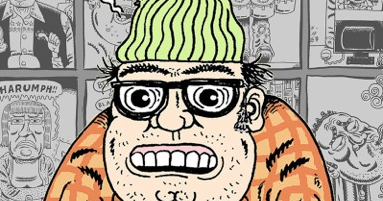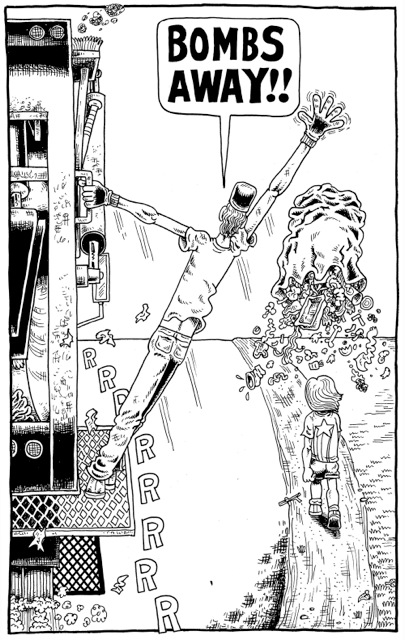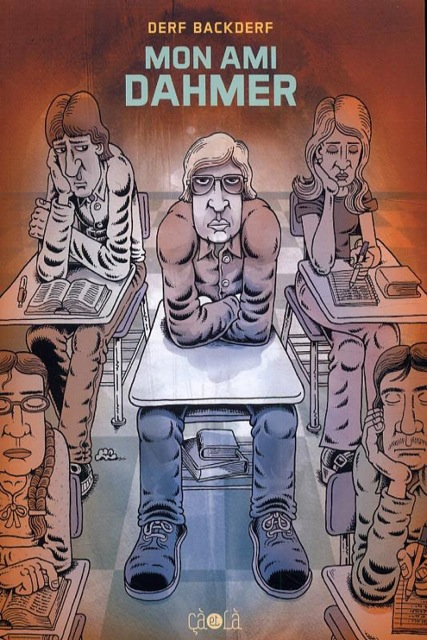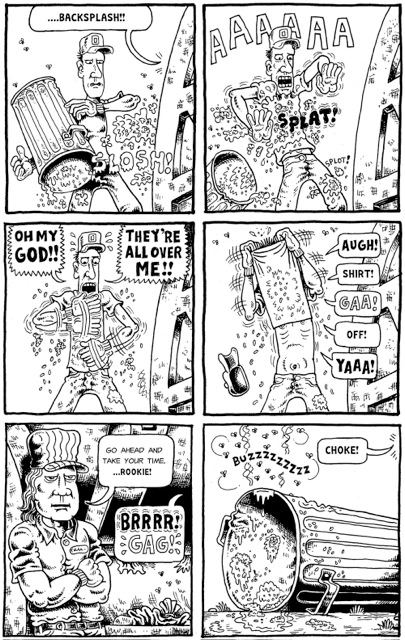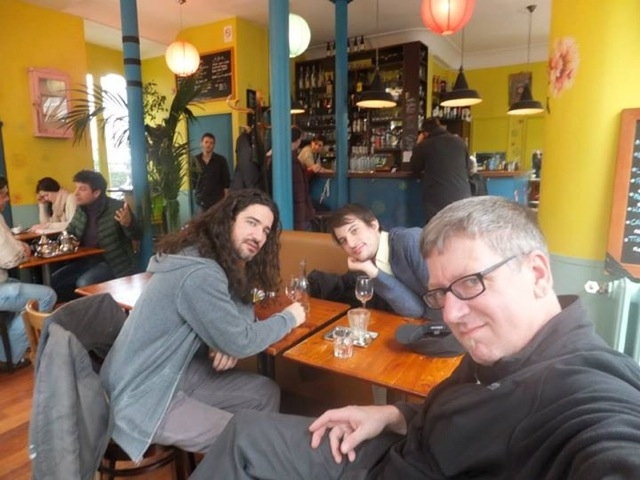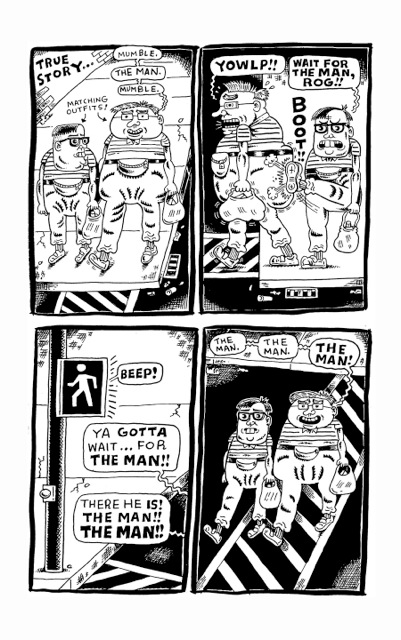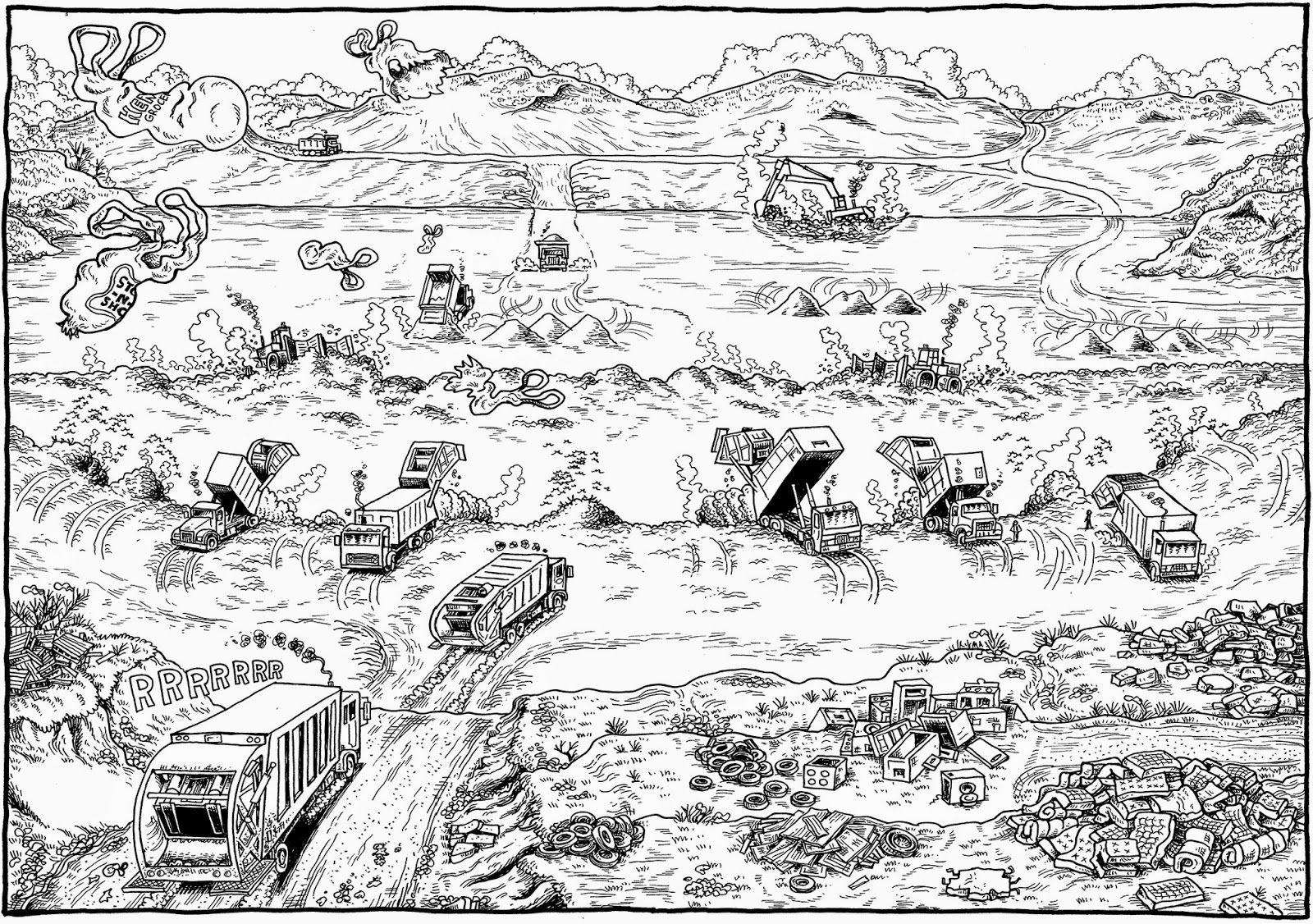Derf Backderf spent the first 40 years of his life aiming, and ultimately succeeding, to become one of the top cartoonists in alternative newspapers. However, he then realized that niche industry was failing, and he needed something else; that's when he found graphic novels.
Since switching his focus from newspaper strips to graphic novels in 2000, Backderf has transformed from a virtual unknown to a curiosity to an international star, with books like Punk Rock & Trailer Parks and his most famous work, My Friend Dahmer. He's now working on on a graphic novel for Abrams about his time working as a garbageman, as well as a pseudo-sequel to Punk Rock & Trailer Parks that explores his time growing up in the Midwest punk scene.
Backderf's opinion on comics as a fan and as a professional has changed over the years as he's witness the decline of the once-thriving alternative weeklies, the rise of graphic novels and the changing face of American comics. I spoke with Backderf about his experiences, his acceptance in Europe, and his own opinions on comics.
Chris Arrant: What are you working on today?
Derf Backderf: I'm inking the last few pages of my next graphic novel. Drawing a blizzard scene, which I've never done before. Seems to be coming out OK; better not get cocky, though.
Earlier this year you made a big transition in ending your weekly comic strip The City, a staple of your career, to focus exclusively on graphic novels. Free weekly newspapers have been declining for a while now, but I know the decision must have been hard. How does it feel now, several months after ending it?
Backderf: Oh, man, it's a big relief. It is SUCH a drag to be in a dying business like weekly papers. In fact, three of them closed last month: The San Francisco Bay Guardian, The Knoxville Pulse and The Providence Phoenix. The Providence paper was one of my client papers, so that was a bummer. Three in one month. That's a record. Five years from now, all but a handful will be be gone. It's a shame.
I did that strip about 10 years longer than I should have. I made the decision to transition to graphic novels and comics way back in 2000. It was the year Craigslist went national, and within (it seemed like, anyways) a couple months, all the paid classified ads were sucked right out of weeklies. And then social media came along right behind, and so there went all the personal ads. Not only was that like half of the revenue stream for weeklies, but those pages of agate type were where the comic strips lived. I saw the writing on the wall then and there and started working in earnest on those first floppies.
And then, when I finally DID start cranking out graphic novels and the strip became very much a secondary gig, I'd decide, OK, this is it, I'm closing it down, but unexpected things kept happening to make me keep it going. I'd get some well-paying gig, or win a Robert F. Kennedy Award or something. I was also making decent money off the strip up until the last year. I mean, obviously, it was more than that. It was hard to let it go. I'd done it for so long -- 24 years-- and it was the thing that made whatever name I had. But finally the newspaper business had withered to the point that it wasn't much of a decision anymore. The nice thing was I didn't slink away as a washed-up has-been, never to be heard from again. I left on my own terms, and for better things.
In retrospect, I should have bailed completely on comic strips in 2000 and gone all in with books. Curse my pragmatic Protestant work ethic!
What’s it like, though, not having something new out every day and hearing from people about your work?
I don't miss it. It was so grueling to make the strip the last year or so. I don't know what it was, but I just couldn't write in the strip format anymore. Graphic novels ruined me as a strip cartoonist! I had the same problem when I started the strip. Before that, my gig was single-panel cartoons, political ones and gag cartoons. Once I started the strip, I couldn't write those anymore either.
I went on a book tour in Europe in April and worked ahead so I'd be free and clear for a month. The plan was, I'd come home and finish out May and then end it, because the last week of May was when the strip debuted way back in 1990, and that’s always been a date that I hold dear. Seemed like a nice bookend. But I got home and sat down to write a strip and ... nothing. I was totally blocked. Not a gag, not an idea, I couldn't even decide what to write about. I stared at a blank piece of paper for three days. Finally, I just said screw it and sent out a goodbye strip I had at the ready, along with a "see ya" email. And that was that. But hitting that send button was hard, I have to admit.
That's why it's nice to have this True Stories series coming out. Volume 1 just hit the stores and the fine folks at Alternative Comics tell me it's selling well. For those who never saw my strip, I'd do these little short stories of real-life observations, various episodes of urban weirdness that I witnessed in my travels about the city. It was the one recurring feature that lasted the whole 24 years, the feature that gave the strip its name. It's the one part of my strip ouvre that has shelf life. Everything else from the strip was too topical. But a True Story from 1991 is still as fresh as the day I drew it. In some cases, that's actually kind of depressing actually. Proof positive we haven't inched forward as a species, as if any proof was needed. So I'm putting out four, or maybe five, volumes, all as 48-pagers, with a full book collecting them all at the end. It's a nice way to commemorate what was a huge part of my life, instead of just letting it dissipate into the void.
In an interview last year you said ,“I'd rather make books and the truth is, I'm a LOT better at graphic novels than I ever was at a comic strip.” Why do you feel you’re better at OGNs than daily strips? Can you point to things you seem to enjoy more in the creation aspect of it over comic strips?
Well, the proof is in the bibliography. I've gotten way more attention and acclaim for my books than I ever got for my strip. Look ... I think it was a very good strip, right up until the end, writing difficulties aside. I busted my ass on that thing, never hacked it in, and am proud of what I did. For a few brief periods in its history, it was ... maybe ... even borderline exceptional. I'd highlight those first couple years, from, say 1990 to 1993, when I really tapped into something, that whole Gen X zeitgeist, and was part of the marvelous alt-comix heyday. Man, that was fun. And then again, when the strip morphed into a political strip, right around Bush's re-election in 2004 and the whole War on Terror drumbeat, I was doing political humor that stacked up with anyone's.
But, to be perfectly frank, it wasn't an important strip. I didn't change the artform or anything, in the way Matt Groening or Lynda Barry or Tom Tomorrow did. I just didn't. And we all want to be that guy. I was successful — only Groening and Tomorrow were in more papers — but my strip will never be included on a short list with theirs. It was missing something essential.
Books are just so much more fulfilling for me. I like how open-ended they are. I can go as long as I want, or as long as the story needs. I can layer the story and have as many characters as I want. And I have room to draw my ass off. I'm not trying to squeeze a little bit of artwork into an ever-shrinking panel that's going to butt a half-page, full-color phone sex hooker ad. A book is my little world. I control everything that's in it.
It's funny, because I go to shows now and people mostly know me through my books and are often surprised that I'm this middle-aged dude. They've only been aware of my work since 2010 or so and, I guess, assumed I must be in my late 20s, rather than a contemporary of grizzled veterans like Bagge and Clowes and Los Bros. And it kind of feels that way to me, too. It's like I rebooted my career and started over. It's a gift.
The release in 2012 of the My Friend Dahmer graphic novel seemed to flip a switch in attention for your work. People view that as your seminal work – but how do you view it? I know you lived with it for decades, from living it to doing an earlier comic and even shopping it around for a while before it was picked up as an OGN.
Oh yeah, My Friend Dahmer was turned down by just about every publisher in the biz. Now, to be fair, the earlier incarnations, and there were several, were not anywhere near as good as the final one. The first stories I drew while I was in the midst of my "brutalist" phase. I was drawing everything really grotesque, all popping eyeballs and veins and bodily fluids. I can't explain why I drew this way. I was channeling Big Daddy Roth or Basil Wolverton or Don Martin, maybe all three. But it was completely inappropriate for the story. It was very frustrating for me, because I had this book in my head, but didn't have the artistic tools to make it. So I spent a decade acquiring those tools.
The other thing I learned from the early rejections was that My Friend Dahmer was not a book that could be pitched. Usually, with a book, you do a sample scene or two, write a synopsis of the rest of the book and make a pitch. But when a publisher saw this book was about Dahmer, all they envisioned was murders, cannibalism, heads in the refrigerator, no thanks. The book isn't about any of those things, but I couldn't get that across. So when I did the final version, the entire book was completed before I even tried to sell it. I figured if I could just get someone to start reading it, the story would hook them, and surprise them. And damned if that isn't exactly what happened. Charlie Kochman at Abrams didn't want to read it at all, but once he did, he had to have it. So I guess it all worked out as it was supposed to, because it couldn't have landed at a better publisher than Abrams.
As for My Friend Dahmer being my seminal work, yeah, I knew that was inevitable. That's the reason I did a couple other books first, because I wanted a body of work before MFD came out. Look, I know I'll never top it, or do another book like it, but it's a hell of a lot easier putting out books after My Friend Dahmer than it was before My Friend Dahmer.
You’re working Trashed, based on an earlier webcomic and comic, and your time as a garbage collector. What’s this book about, for those who have or haven’t read those?
It's a comedy, a nauseating, stomach-churning comedy, about this vast secret world of garbage, all woven into a raucous narrative about three young friends, facing dim prospects, like most 20somethings, who find themselves working on a garbage crew, the crappiest of all crap jobs. Anyone who has ever been in a soul-sucking job -- and haven't we all? -- will relate to this tale, while also realizing, hey, guess I didn't have it so bad after all, because nothing -- NOTHING -- is worse than this! Trust me on that.
Americans throw crap away in numbers unprecedented in human history. If you filled up garbage trucks with the amount of trash we throw away in a single year and put them bumper to bumper, the line of full garbage trucks would stretch all the way to the moon! And that's just ONE YEAR! But most of us don't think about garbage at all. We put it out on the curb and -- poof! -- we come home and it's gone. Like magic! The story of what happens to it is more revolting and bizarre than you could possible imagine. It's also another of my tales about weird Midwestern towns and all the bizarre folks that inhabit them, the closet neo-Nazis and anal-retentive retirees who flip out if their cans get dented and the anti-government kooks ... and imagine the fun of hanging off the back of a garbage truck in a blizzard ... or an April deluge. Reading Trashed will be like spending a day as a garbage man ... minus the smell. And the maggots. Actually, it would be great to make it a scratch-and-sniff book! Although, I'm betting the stores and libraries wouldn't appreciate that.
I've culled my own experience as a garbage man for this story, but it's fiction, not memoir like My Friend Dahmer. It's closer to Punk Rock & Trailer Parks, which was inspired by my experience, in that case as a punk rocker, but was also complete fiction. I like writing from experience, even if it's fiction, because you can achieve an incredible level of detail and depth. Nothing like living the story and writing what you know.
As you note, it's been an ongoing project for a while. The first Trashed floppy was a memoir, detailing my own experience on the job. It's early stuff, and pretty rough, but of all the books I've done, that's the one that is universally liked, at least by the few who read it. Got me my first Eisner nomination, too, which was a great way to kick off my graphic novelist transformation. It was only 50 pages, though, and the plan was always to come back to it at some point. It just took a little longer than planned. I finally did in 2009, after I finished Punk Rock & Trailer Parks, as a webcomic, purely as a creative exercise, really. At that point, I moved it into the present day and made it a fictional story, just so I could have more freedom with it. I drew another episode in 2011 but put it on hiatus when the MFD book tour started. I always planned to come back to it, and had written a couple more episodes which I was itching to get to. But Charlie and I were discussing my next book, kicking around some ideas, and I told him about the webcomic and he said, whoa, don't do a webcomic. Let's do it as a book. So I have. I took down the webcomic episodes I had previously done, rewrote and redrew everything and added the new material I was going to do anyways and made it into one long narrative. I think it's a pretty strong book. It's a real fun, gross-out read, with some great characters. It'll clock in around 250 pages, so it's the biggest book I've done to date. It'll be released fall 2015.
In the past 18 months, your comics have gotten new life in Europe, even winning you an award at Angouleme earlier this year. What do you think of being a guy from Shaker Heights and Cleveland finding a massive audience, a foreign one, so far away?
It's all been amazing. It's been the highlight of my life and career, that's for sure. The Dutch version will be coming out in time for Angoulême this year. I'm really looking forward to that. That's following the French, Spanish and German editions. And it's not just MFD. My French publisher, Éditions çà et là, released Punk Rock & Trailer Parks after MFD, and THAT became a bestseller, too! And that was incredibly gratifying because PR&TP didn't sell that well when it came out in the states, which was very frustrating because I was really proud of that book and it got great reviews. But in the stores: meh. So here it is a big hit in France, this crazy tale of punk rockers in Akron friggin’ Ohio, and readers in Paris and Marseilles totally dig it. It just cracks me up no end. I hear from readers and critics there that they're fascinated by these tales of the American Rustbelt. It amazes them that such a place even exists! I guess it does me, too.
And you’re attending Angouleme again this year, before jumping into a month-long European book tour. What’s that like for you? Do you plan on doing any comics during the trip, or are you just soaking it in?
There's no time! The thing about European fans is that they expect you to not just sign a book, but do a nice drawing on the title page. The French call it a dédicace. They sit there and watch you draw it. So the entire time I'm over there, I'm drawing my ass off. My last month-long tour, I was at this fabulous comic shop in LeMans, the Librarie Bulle, just the most amazing store I've ever seen, anywhere. It's run by this incredibly friendly guy, Sam, who appears to be the most well-known guy in the entire city. The store is packed with buyers every day. It's amazing. Well, for my signing, the line stretched, literally, out the door. I did over 100 dédicaces in a single afternoon! That's like a whole chapter of a book! My hand ached for days, and I didn't get any time off to heal, because I had at least one signing every day. I get home from these tours and take a couple weeks off to recover.
I do try to carve out couple afternoons a week just to write when I'm on a trip, maybe in a Paris cafe, over a nosh or a coffee. Yeah man, it doesn't get any better than that. I can see why all the old comics guys move to France. The love for comics there is palpable.
In the middle of all this you’ve been working on and off on a webcomic called The Baron of Prospect Avenue. I know you put it on hiatus in order to finish Trashed for publication next year, but what’s that like having this story looming for you, especially since it’s about things more recent than Trashed in your life?
Yeah, it's a continuation of Punk Rock & Trailer Parks. This time set in Cleveland, which is where I've lived for the past 30 years. I just wanted to work again with Otto, my protagonist, because he's such a great character and so fun to write, and one day this story popped into my head. When I get back from Europe I'll dive into it again. The last page I posted is a cliffhanger, so readers have been nagging me to get back to it. Probably wasn't the brightest thing to start it then shelve it after a couple months. Didn't have any choice though. This Trashed deadline is a beast. I've never flipped around an entire book in one year (and I won't do it again). I've got some other projects I'm developing, too, one set in 1900. So I'm broadening my scope.
You grew up in punk music, and are seemingly influenced by that as much as you are by comics. Do you have any ambitions to do more music comics or do art for musicians?
The Baron of Prospect Avenue will have some music in it, from the post-punk era, which I loved, once the hype died down and everything went back underground. When I started making comix at age 20, I stopped reading comix. That's when I immersed myself in the music scene. And yeah, I've fed off that ever since.
I periodically do record covers and posters for bands. Just drew a wraparound 7-inch cover for the Styrenes last year, one of Cleveland's early legendary punk bands. That was fun. Then I did a tour poster for Lucius, which is a hot band out of Brooklyn. A couple of the members are fans of my stuff. And I did a a cover and a series of full-page illustrations for a Belgian music mag featuring all my characters from PR&TP. That came out really well and was also a lot of fun to draw. Problem is, the music biz is as strapped for funds these days as the newspaper biz. Might as well just stick with comix.
"When I started making comix at age 20, I stopped reading comix." Can you elaborate on that, stopping reading comics once you got in the business? Is that still the case?
I went totally cold turkey on comix when I was at Ohio State and started doing cartoons for the school paper. From age 10 until 18, I was a total comix fiend. Cleared the rack every week and amassed a ridiculously large collection, which I read and studied obsessively. Too obsessively, because I pathetically (and badly) aped whatever artist I favored at any given time. I figured the only way I could find my own style was to gestate on my own, so I boxed up my collection and stayed out of the comix shops. And it worked. I may or may not suck, but nobody really writes like me and nobody draws like me. My inspirations came from other things, particularly the music scene which I obsessively immersed myself in when I gave up obsessively reading comix.
It really wasn't that big a deal. I was bored with mainstream stuff by that time anyways. They were pretty miserable in the Eighties. I leafed through the early indie stuff, and that was great, but I didn't buy any of it. I stuck to my plan.
I still don't read many comix. I'll see stuff at shows, or creators will give me books to read, so I have an idea of what's out there and who's doing great work, but I don't have any desire to be a big comix reader again, or to amass 20,000 books. I admit I get a lot of strange looks from comix folk when I confess that.

